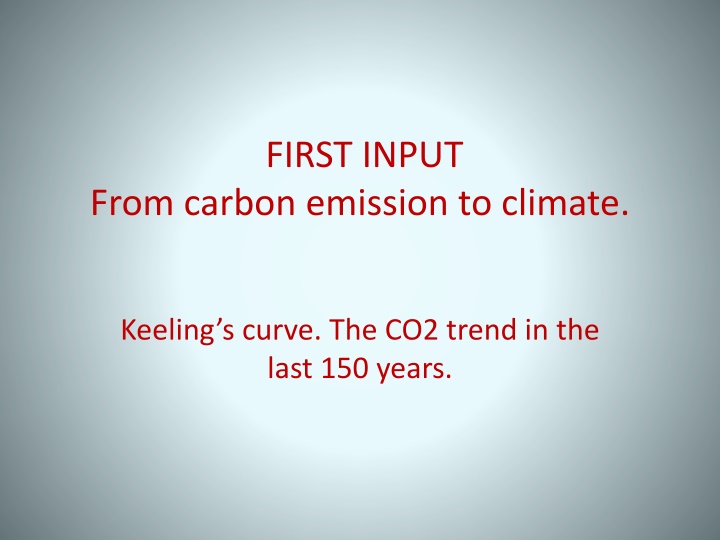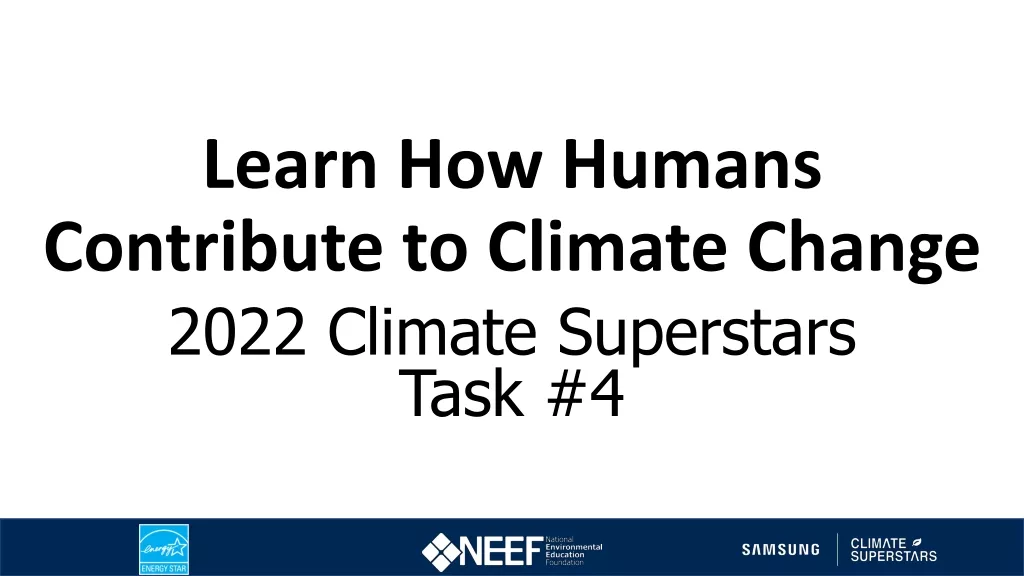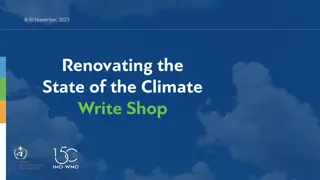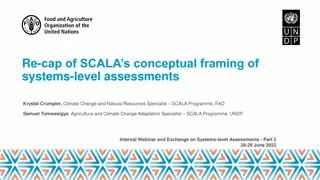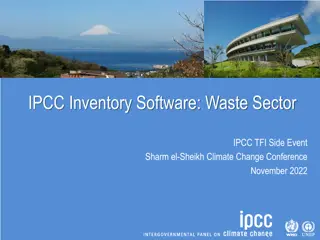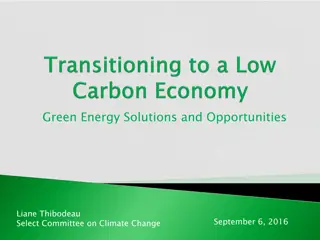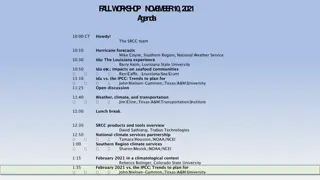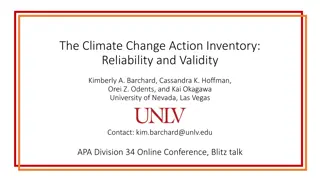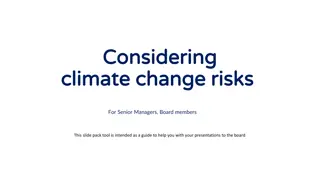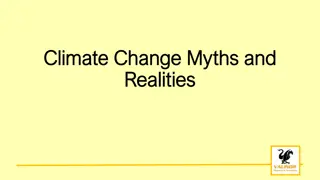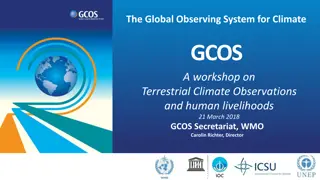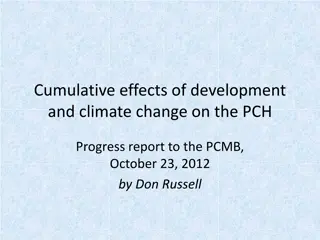Impact of Human Activities on Climate Change: IPCC Reports and Trends
The IPCC Fifth Assessment Synthesis Report highlights the clear influence of human activities on the climate system. Data reveals a consistent rise in global temperatures over the past 150 years, with each decade warmer than the last. The IPCC emphasizes the urgency to limit climate change to build a sustainable future. Oceans play a crucial role in absorbing heat, while greenhouse gas concentrations continue to escalate. As the main drivers of warming, human actions since the mid-20th century have been identified as the dominant cause of climate change.
Download Presentation

Please find below an Image/Link to download the presentation.
The content on the website is provided AS IS for your information and personal use only. It may not be sold, licensed, or shared on other websites without obtaining consent from the author.If you encounter any issues during the download, it is possible that the publisher has removed the file from their server.
You are allowed to download the files provided on this website for personal or commercial use, subject to the condition that they are used lawfully. All files are the property of their respective owners.
The content on the website is provided AS IS for your information and personal use only. It may not be sold, licensed, or shared on other websites without obtaining consent from the author.
E N D
Presentation Transcript
FIRST INPUT From carbon emission to climate. Keeling s curve. The CO2 trend in the last 150 years.
What is the IPCC? The Intergovernmental Panel on Climate Change (IPCC) is the international body for evaluate the science related to climate change. (IPCC)
IPCC Fifth Assessment Synthesis Report Key Messages : Human influence on the climate system is clear (IPCC)
IPCC Fifth Assessment Synthesis Report Key Messages The more we destroy our climate, the more we risk the serious effects.
IPCC Fifth Assessment Synthesis Report Key Messages We have the ways to limit climate change and build a more prosperous future
Humans are changing the climate Main cause of warming by IPCC is that people are the dominant cause of warming since the mid-20th century. (IPCC)
Temperatures continue to rise Each of the past 3 decades has been successively warmer than the preceding decades since 1850 (IPCC)
Oceans absorb most of the heat More than 90% of the energy accumulating in the climate system between 1971 and 2010 has accumulated in the ocean Land temperatures remain at historic highs while ocean temperatures continue to climb
Globally averaged sea level change (IPCC) 1993, the first year of satellite altimetry data
Globally averaged greenhouse gas concetrations (IPCC) Atmospheric concentrations of the greenhouse gases : carbon dioxide (CO2, green), methane (CH4, orange) nitrous oxide (N2O, red)
Sources of emisions Energy production remains the primary driver of GHG emissions 35% (IPCC)
Observed Changes (IPCC) Human influence on the climate system is confirmed Recent anthropogenic emissions of greenhouse gases are the highest in history. Recent climate changes have had widespread impacts on human and natural systems.
Observed Changes (IPPC) Observations since 1950 shows that: Atmosphere and ocean have warmed Snow and ice amounts have reduced Sea level has risen
Some of the changes in extreme weather and climate events observed since about 1950 have been linked to human influence (IPCC)
Little break paper critters https://www.youtube.com/watch?v=ganSY5K 4b4Y http://www.papercritters.com
What is the IPCC? The Intergovernmental Panel on Climate Change (IPCC) is the international body for .. the science related to
What is the IPCC? The Intergovernmental Panel on Climate Change (IPCC) is the international body for evaluate the science related to climate change. (IPCC)
IPCC Fifth Assessment Synthesis Report Key Messages : ... on the climate system is clear
IPCC Fifth Assessment Synthesis Report Key Messages : Human influence on the climate system is clear (IPCC)
IPCC Fifth Assessment Synthesis Report Key Messages The more we distroy our ......., the more we risk serious impacts
IPCC Fifth Assessment Synthesis Report Key Messages The more we destroy our climate, the more we risk the serious effects.
Humans are changing the climate It is extremely likely that we are the dominant cause of warming since the mid- . century.
Humans are changing the climate Main cause of warming by IPCC is that people are the dominant cause of warming since the mid-20th century. (IPCC)
Temperatures continue to rise Each of the past . . has been successively warmer than the preceding decades since 1850
Temperatures continue to rise Each of the past 3 decades has been successively warmer than the preceding decades since 1850 (IPCC)
Oceans absorb most of the heat More than . % of the energy accumulating in the climate system between 1971 and 2010 has accumulated in the ocean Land temperatures remain at historic highs while ocean temperatures continue to
Oceans absorb most of the heat More than 90% of the energy accumulating in the climate system between 1971 and 2010 has accumulated in the ocean Land temperatures remain at historic highs while ocean temperatures continue to climb
Globally averaged greenhouse gas concetrations (IPCC) Atmospheric concentrations of the greenhouse gases : ...... dioxide (CO2, green), ....... (CH4, orange) nitrous ..... (N2O, red)
Globally averaged greenhouse gas concetrations (IPCC) Atmospheric concentrations of the greenhouse gases : carbon dioxide (CO2, green), methane (CH4, orange) nitrous oxide (N2O, red)
Observed Changes ..... ......... on the climate system is confirmed Recent anthropogenic ......... .. .......... ....... are the highest in history. Recent climate changes have had widespread impacts on human and natural systems.
Observed Changes Human influence on the climate system is confirmed Recent anthropogenic emissions of greenhouse gases are the highest in history. Recent climate changes have had widespread impacts on human and natural systems.
Observed Changes (IPCC) Observations since 1950 shows that: Atmosphere and ocean have ...... Snow and ice amounts have ....... Sea level has .....
Observed Changes (IPCC) Observations since 1950 shows that: Atmosphere and ocean have warmed Snow and ice amounts have reduced Sea level has risen
Some of the changes in extreme . and ....... events observed since about 1950 have been linked to human influence
Some of the changes in extreme weather and climate events observed since about 1950 have been linked to human influence (IPCC)
Industrial revolution A series of extraordinary .. in 1800s changed the way people lived and worked for the next 150 years Inventors had found a new way to use nature s They build new kind of machine powered by water, .. and ..
Industrial revolution A series of extraordinary innovations in 1800s changed the way people lived and worked for the next 150 years Inventors had found a new way to use nature s energy They build new kind of machine powerd by water, steam and coal
Industrial revolution Everything could be done cheaper and Work was done outside the home in a special ...... Fuel, clothing and .... became more affordable
Industrial revolution Everything could be done cheaper and faster Work was done outside the home in a first factories Fuel, clothing and food became more affordable
Industrial revolution Families moved from villages to new . Development of .. and steam boats allowed to sell the goods around the ... .. from coal powered factories turn the cities black
Industrial revolution Families moved from villages to new industrial town Development of locomotives and steamboats allowed to sell the goods around the world Pollution from coal powered factories turn the cities black
Break 10 minutes Belgian dance https://www.youtube.com/watch?v=OnYbgGq yMlk
THIRD INPUT Exercise Try to recreate the climate trend in Italian territory in the last year also in the past years (like 50 years ago) and 150 years ago. Compare the results in pairs (look for your partner) Match two couples and make groups of 4 - discuss your views and reach class common idea about the climate changes Present your result in front of class ( 3-4slides PPT)
THIRD INPUT https://www.ncdc.noaa.gov/cdo- web/datatools/selectlocation http://www.metric- conversions.org/pl/temperatura/fahrenheit- do-celsjusz.htm
